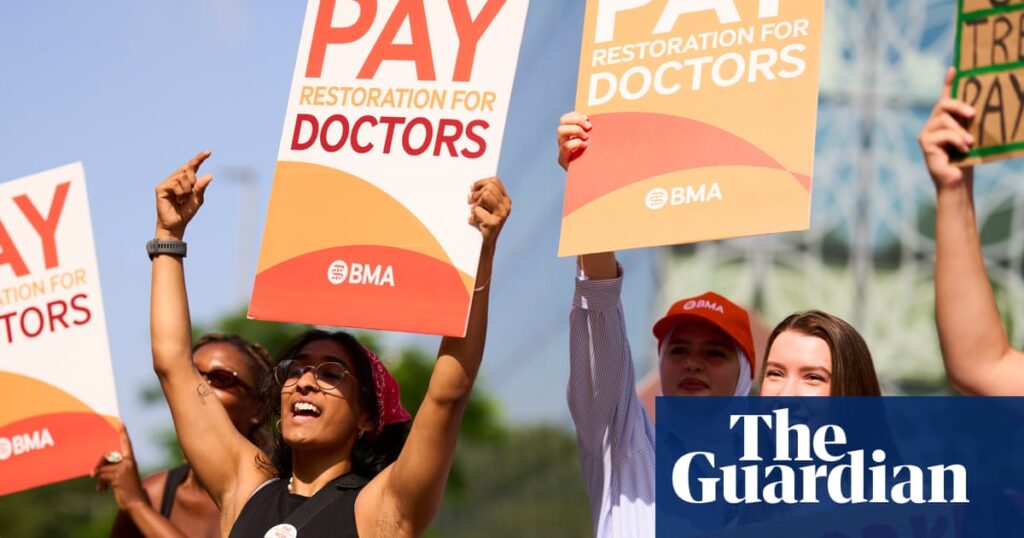Thousands fewer resident doctors are thought to have joined picket lines on Friday during the first day of a five-day strike compared with last year’s mass turnout.
Although NHS England will only publish data on turnout and cancellations next week, hospital leaders are understood to have observed fewer resident doctors (previously known as junior doctors) on strike and less disruption to services than during the last round of industrial action, which ran from March 2023 until July 2024.
While ministers and officials will not receive any statistics until after the five-day stoppage ends on Wednesday, there is a hope within government that the impact might be mitigated, in part by a lower strike turnout.
The British Medical Association (BMA) is refusing to comment on how many of its members have joined the stoppage until it is over.
The strike will continue until 7am on Wednesday. The public have been urged to keep coming forward for NHS care during this period, and NHS England has urged hospital chief executives to keep routine operations and appointments and only reschedule if there is a risk to patient safety.
The NHS chief executive, Jim Mackey, told broadcasters on Friday that the NHS was taking a new approach after learning from previous strikes that “harm to patients and disruption to patients was much broader than the original definitions”.
“Colleagues in the service have tried to keep as much going as humanly possible as well, and the early signs are that that’s been achieved so far, but it is early doors,” he said. “The thing that colleagues won’t compromise is safety in the actual delivery. But it does look like people have really heard that. They’re really pulling together to maximise the range of services possible.”
Mackey noted that further strikes were “possible” given the BMA has a six-month mandate.
Speaking shortly after the start of the strike on Friday morning at the NHS England headquarters in London, where officials are monitoring its impact, Wes Streeting, the health secretary, praised NHS staff whom, he said, were trying to limit its effects.
This included, he said, “many resident doctors who have ignored their union and are turning up for work”.
Streeting said, however, that patients would feel the impact, saying: “We know that there have been operations, appointments and procedures already cancelled, and we know that there will be real challenges over the next five days.”
Calling the BMA’s decision to hold the strike a “reckless and unnecessary action”, he added: “We won’t let the BMA hold this country to ransom.”
The BMA has agreed to requests for doctors to come off picket lines and work in hospitals experiencing the most pressure. One doctor was told to return to work at Nottingham City hospital’s neonatal intensive care unit over the weekend, and a request from Lewisham hospital in south London for two anaesthetists to work on Saturday was also accepted.
after newsletter promotion
A smaller strike turnout has been expected because the BMA achieved a lesser mandate in the strike ballot than in 2023. Of 48,000 members, 55% voted, of whom 90% supported industrial action – representing less than half of members – compared with a turnout of 71.25% in 2023’s expanded electorate, of whom 43,440 (98.37%) voted to go on strike.
During the last round of 12 strikes in 2023 and 2024, nearly 1.5m appointments were rescheduled. In the final industrial action from 7am on Thursday 27 June to 7am on Tuesday 2 July, 23,001 staff were absent from work at the peak of the action.
The BMA is asking for a rise of 29% over the next few years in order to achieve what it considers to be full pay restoration to pre-2008 levels, after the 2023 industrial action resulted in a pay bump of 22% to cover 2023-24 and 2024-25. At present, ministers have offered a 5.4% pay rise for 2025-26.
The BMA council chair, Dr Tom Dolphin, told BBC Radio 4’s Today programme that a “clear, guaranteed pathway” to pay restoration would be required for resident doctors to return to work
He said: “So you’ve got last year’s pay offer which did indeed move us towards [pay restoration], but Wes Streeting himself said that pay restoration is a journey, not an event, implying that there would be further pay restoration to come, and we were expecting our pay to be restored in full – that’s our campaign’s goal. We got partway there, but then that came to a halt this year.”
Keir Starmer made a last-minute appeal to resident doctors, saying the strikes would “cause real damage”.
“Most people do not support these strikes. They know they will cause real damage … These strikes threaten to turn back the clock on progress we have made in rebuilding the NHS over the last year, choking off the recovery,” the prime minister said.


